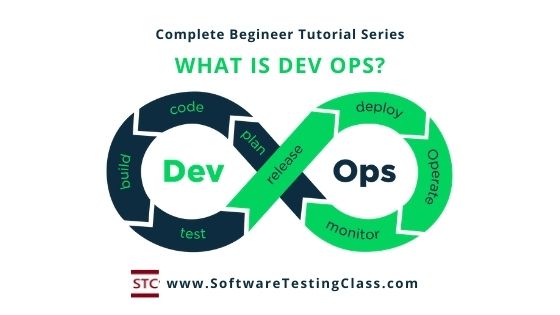DevOps is the new term that has been introduced in the project agile methodology. It is quickly spreading throughout the technical community and covers a group of concepts. It includes a standard framework like ‘Quality’, or ‘Agile’. This term has been introduced as a result of two popular trends. These two trends are as follows.
- Agile operations or infrastructure: It is related to the application of the Agile concepts which is susceptible to frequent changes in the project.
- Collaboration between Development and Operations team: It is related to the collaboration of both teams in the project at all stages of the software development lifecycle. It includes both the creation and operation of the services in the service-oriented environment.
What Is DevOps?

Patrick Debois has introduced the word “DevOps” in 2009. It is the combination of two words i.e. “development” and “operations” and therefore, it must include the collaborations between the development and operations teams. It is neither a process nor a technology. It is a work culture i.e. “DevOps culture” or a “DevOps movement” that brings various members of different teams to work close to each other in collaborations than in silos. The “DevOps environment” can be referred to as an IT organization that has adopted a “DevOps culture”.
The “DevOps” is a change to the traditional IT culture of working as different in silo teams and focus on rapid service deliveries by adopting lean, and agile practices as a system-oriented approach. It is a new culture that improves the collaboration between development and operations teams. It further focuses on the utilization of technologies such as automation tools, and programmable and dynamic infrastructure from a life cycle perspective. It is a mindset to cut short the software development cycle by using fast feedback loops to deliver fixes, product features, and frequently changes to the product.
Definition of DevOps
DevOps can be defined as a cross-disciplinary community of practice that has devoted to the study of continuously building, evolving, and operating quickly changing resilient systems at scale. In other words, DevOps can be understood as a practice of operations and development team members who are participating together for the service lifecycle entirety that includes design creation, development process, and production support. It brings a very close collaboration between the development and operations team where both teams were known to be working in silos. It enables the operations staff to make use of many same techniques as developers do for their systems work. Such techniques can range from design, source code control, testing, and participation in an Agile development process.
Based on the concept just explained, the term DevOps does not differentiate between system admins and developers. The ‘Dev’ term is used as a blanket term for developers in the development team irrespective of their technical stream skills, the Quality Analyst, the product team members, and other such related disciplines. The ‘Ops’ term is used as a blanket term for system administrators, database administrators (DBA), system engineers, release engineers, security champions, and other technical administers.
DevOps model operates on the Agile and Lean approaches. It supports collaboration between the development and operations teams as opposed to the old concept where both teams work in a silo and ‘Ops’ team depends on the ‘Dev’ team to complete the deliverables before they can start operations on the developed product. Such a collaboration model can be understood as an outgrowth of Agile as the agile software development practices support a very close collaboration of product management, developers, customers, and QA to rapidly iterate towards a better product in sprints. Therefore, DevOps can be considered as an extension of the Agile principles beyond the boundaries of coding the software product into the entire delivered service.
Where Did DevOps has Come from?
The “DevOps” culture has not developed through stories and testimonials from the experts but it is the typical mindset that has developed over the period which is nurtured by forward-thinking IT experts from various disciplines. The two primary backgrounds of DevOps are as follows.
- Enterprise systems management (ESM): The initial definition of DevOps has come from the system administrators, which were the operations experts. They brought the ESM best practices to include the DevOps culture, such as system monitoring, configuration management, automated provisioning, and the toolchain process approach.
- Agile development: DevOps can be considered as an addition to the agile software development practices, which prescribes a very close collaboration among product management, developers, customers, and QA to rapidly iterate a product in sprints. The DevOps ingests the concept of Agile and Lean methodologies and implements them into the service delivery as a fundamental part of the value proposition to the client as well as the product team. Therefore, the DevOps is an extension of the Agile principles beyond the boundaries of coding the applications to the delivered service entirety.
Conclusion
In this article, we discussed DevOps culture as well its definition along with the origin of the ‘DevOps’ word.
Checkout all DevOps posts here:
- What is DevOps? Where it has come from?
- What Are the Challenges And goals of DevOps Solution?
- Where Are You on the DevOps Continuum?
- What Are the Phases of DevOps Maturity?
- What The various Tools Used in DevOps?
- What are the values of DevOps Culture?
- What is the History and future of DevOps?
- What Are the DevOps Goals and Challenges?
- Difference between Regression Testing vs Retesting?
- Detailed Understand of Usability Testing: What? Why? & How?
- What is Risk Based Testing in Software testing?
- Why Should Enterprises Embrace DevOps and Agile in Today’s Age of Digital Disruption?
- Tutorial 7: Hadoop MapReduce Example on Join Operation and Counter
- Top 5 Predictions for the Future of Software Testing in 2020 and Beyond
